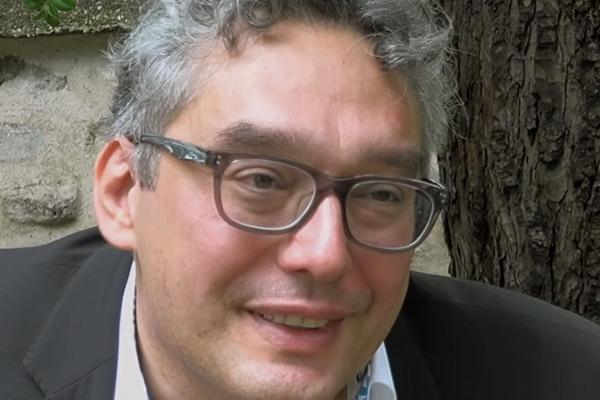Jules Verne Writing Residency Brings Michaël Ferrier to Ohio State

[Original article published by the College of Arts and Sciences at The Ohio State University]
Michaël Ferrier has been to the United States before, but he’s never been to the Midwest.
When Ferrier, a French writer and professor based in Tokyo, lands in Columbus on Thursday for a three-week stay, his presence will help enrich the education of students across the Ohio State campus as well as the Francophile community in Ohio.
But he also hopes his time in the Midwest provides great material for his upcoming book on American scientist Buckminster Fuller. Fuller invented, among other things, the geodesic dome.
“It’s essential to feel places,” Ferrier said. “I need to see a geodesic dome for real, not only a picture or Google images. I need to feel something close, and I need to meet some people, to talk to people. Sometimes that opens a galaxy of information.”
Ferrier’s arrival in Columbus is owed to the creation of the Jules Verne Writing Residency, a key component of the Center of Excellence in the Department of French and Italian. The department was invited to join the Center of Excellence network — a collection of just 22 programs at universities in the United States — by the Cultural Services of the French Embassy in 2020.
Associate Professor Benjamin Hoffmann, who serves as the center’s director, prioritized creating a writing residency as one of the center’s first moves. Wanting to attract French writers from around the world to come stateside, he named the residency after Jules Verne, the acclaimed French novelist who authored famous books such as Journey to the Center of the Earth and Twenty Thousand Leagues Under the Sea.
To find his first resident and set the tone for the program’s future, Hoffmann knew he wanted a French writer with a global perspective — someone who could speak to French’s standing as a worldwide language. Ferrier, a well-known writer and a professor at Chuo University in Tokyo, was the “perfect embodiment” of that person.
“French literature is at its core really international,” Hoffman said. “It’s not about French people living in Paris and talking about their life in Paris — something that would be very narrow-minded and something that French literature has been in the past. It can be a way [to open people to] this multicultural world we are living in right now.”
A global background and an understanding of a multicultural world comes naturally to Ferrier. He was born in Strasbourg, a city on France’s border with Germany that shares language and culture with its eastern neighbor. His father is from Madagascar, and he has family roots in different countries around the Indian Ocean.
That diverse background drew him to study and eventually teach in Tokyo and attracted him to the United States for the Jules Verne Writing Residency. It’s also a big reason why he’s planning a trilogy of books about lesser-known scientists from around the world, including Fuller.
“I think the entire world has been built like this,” Ferrier said. “I like to show that not only France but all countries are built with many, many multicultural supports.”
In his residency that spans through Feb. 10, Ferrier will give lectures to Ohio State students in the Department of French and Italian as well as students in the Department of Near Eastern Languages and Literatures. On Jan. 26, he’ll speak on Zoom about the “fault lines” in our current world. As part of his residency, he’ll also discuss one of his novels at the Cuyahoga County Public Library’s Beachwood Branch in early February.
But there’s plenty Ferrier will learn from Ohio State students as well. In his previous visits to the U.S., he’s been impressed with the directness and candor of American students, something he doesn’t always get from students in Japan or Europe. A more open back-and-forth is essential for his writing and deepens the detail in his storytelling.
“We are supposed to teach the students, but in fact we learn a lot,” Ferrier said. “That’s the success of a good pedagogic relationship, this interaction where you learn as much as you teach.”
The work doesn’t stop for Hoffmann and the Center of Excellence once Ferrier leaves. Hoffmann hopes that this first writing residency strengthens the bonds between the Department of French and Italian and other departments across campus.
He also expects it to strengthen ties to the Francophile community in Ohio, build partnerships with universities in Cleveland and get future residents to travel from Ohio State to other Centers of Excellence at campuses in the U.S.
“The creation of the writing residency was a big endeavor for sure, and we’re already thinking about the next selection for 2023,” Hoffmann said. “We see the residency as being a big focus of ours.”
For Ferrier’s part, he’ll head back to Japan in February and finish work on the first book in his lesser-known scientists trilogy before beginning his book on Fuller. Thanks to his residency at Ohio State and truly getting to experience the country firsthand, Ferrier knows he’ll write better books.
“We are now in the COVID era. We all know that we are communicating by Zoom or other tools,” Ferrier said. “But we are forgetting now little by little, something essential in human life, you have to touch people, you have to see them face-to-face and you have to interact with them in a real way.
“This program important because it’s real. It’s real. It’s there in front of you. It’s not on a screen, it’s not only an image. This is a thing I would like to say. Don’t forget the real life.”
